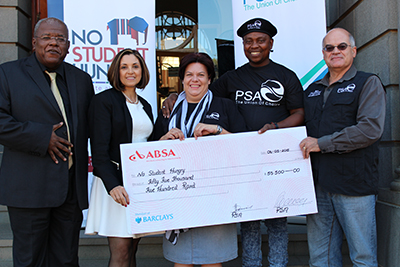Latest News Archive
Please select Category, Year, and then Month to display items
13 January 2020
|
Story Eugene Seegers
|
Photo Anja Aucamp
 Spearheading the digital expansion of the conversational Sesotho course is IDEAS Lab Director, Johann Möller (middle). With him are from the left: Prof Pule Phindane, CUT; Dr Brenton Fredericks, CUT; Bahedile Letlala, UFS Department of African Languages; and Dr Elias Malete, UFS Department of African Languages.
Spearheading the digital expansion of the conversational Sesotho course is IDEAS Lab Director, Johann Möller (middle). With him are from the left: Prof Pule Phindane, CUT; Dr Brenton Fredericks, CUT; Bahedile Letlala, UFS Department of African Languages; and Dr Elias Malete, UFS Department of African Languages.
For many years now, the UFS has been offering a one-year course in conversational Sesotho for staff members; this can then be followed up with the one-year course in advanced conversational Sesotho. The conversational Sesotho for students in the Faculty of Education was introduced in 2018 at the UFS.
The Central University of Technology (CUT) needed a conversational course for its first-year students and approached the Department of African Languages for the development of such a course. Living as we do in a multilingual country; this additional language skill opens doors and often hearts as well.
Using instructional design principles
However, the need was identified by both CUT and UFS to present this crucial information in a way that would be more appealing to digital natives as well as to those less familiar with technology. The Department of African Languages on the UFS Bloemfontein Campus, together with relevant departments from the CUT, approached the IDEAS Lab located on the UFS South Campus, since they already have a reputation for being a specialist on broadcasting and repackaging curricular content for digital presentations. The IDEAS Lab provided technical advice and built the multimedia programme, which will help the user to hear and practice phrases in Sesotho, using instructional design principles. The course will be available to both staff and students belonging to the two universities.
Room for growth
Johann Möller, Director of the IDEAS Lab, says this pilot programme will give both institutions the opportunity to test the use of multimedia for language acquisition. He adds, “Language is extremely complex, and we would like to expand this learning aid in the future.” In fact, the original design has room for growth built into it.
To keep things simple for the user and the building team, it was decided to start out with only four potential everyday scenarios where a staff member would like to speak Sesotho: Firstly, how to greet other persons from different genders; secondly, potential scenarios one might encounter in the university environment itself; thirdly, how to deal with situations at a hospital; and finally, how to use one’s language skills at a filling station.
Pronunciation is key
Each scenario contains three to four conversations that the learner can revise, along with images and audio that illustrate the situation and assist with correct pronunciation. The system does not allow the user to progress unless they have listened to the pronunciations of the sample sentences or phrases.
Further reading material and vocabulary lists are also provided, with the result that people who are using the programme can learn at their own pace. The authoring software Articulate Storyline was used to build the individual scenarios and each conversation or lesson within it. The lessons are also not dependent on an internet connection; they can be downloaded onto a flash memory drive and used offline.
No Student Hungry Programme presented with a generous donation
2015-05-18

From Left: Prof Jonathan Jansen, UFS Vice-Chancellor and Rector, Mrs Grace Jansen, Custodian of the NSH, Ms Lynsie Pelser, PSA Free State Social Responsibility Chairperson, Dr Vuyo Dyantyi, PSA President, and Mr Gerhard Koorts, PSA Provincial Manager. |
The Public Servants Association of South Africa (PSA) presented a cheque for R55 500 to the No Student Hungry Programme on 7 May 2015 at the UFS Bloemfontein Campus. The PSA has been a proud supporter of NSH, and of initiatives such as the NSH 1000/33 Stride that saw four volunteers walk from Bloemfontein to Cape Town to raise funds for the programme from the send-off on 1 May 2014 to the welcoming on 3 June 2014 in Cape Town.
On receiving the cheque, Prof Jonathan Jansen, Vice-Chancellor and Rector of the UFS, expressed his gratitude on behalf of the university and all the students who stand to benefit from this initiative.
As a politically non-affiliated union, the PSA’s main focus is labour development and community support throughout the Free State and nationally. The NSH has received a total of R165 000, donated by the union since 2014, which supports more than 25 students.
The President of the PSA, Dr Vuyo Dyantyi, said “Our motto is to invest in human potential, and in programmes that will give the future generation a chance to prosper.”
The No Student Hungry Programme supports more than 130 students each year with daily meals, mentorship, and support on all three campuses.